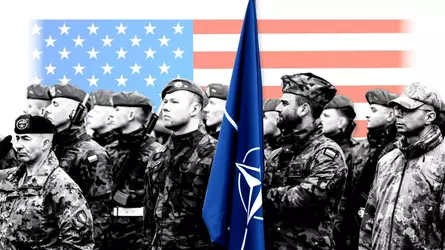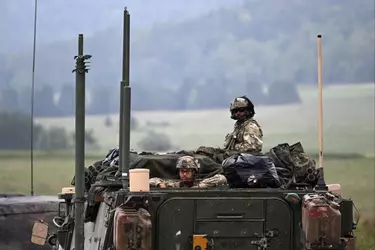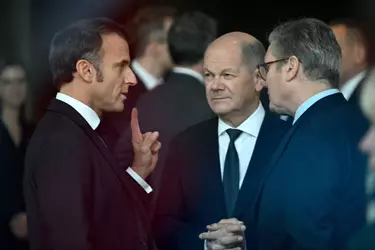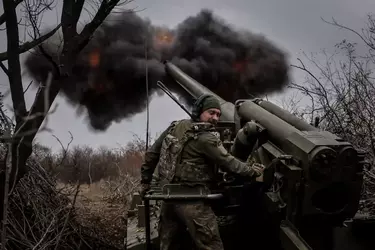Can Europe defend itself with less American help?
Financial Times (archive.ph)
By John Paul Rathbone, Henry Foy, and Ben Hall
2024-11-25 05:00:02GMT

In March, Poland marked 25 years since joining Nato. The war in neighbouring Ukraine has raised concern about its own security © FT montage; AFP/Getty Images
Imagine it is 2030. Russia and China are holding their first major military exercises in the Arctic. Called Vostok 2030, the joint drill involves thousands of troops, tanks, aircraft, and most of the Russian and Chinese northern fleets. It is just the latest manifestation of Moscow and Beijing’s “historic partnership”.
Over the past five years, Russia and China have steadily increased their military and economic presence in the Arctic. The 2025 “ceasefire” in the Russo-Ukraine war allowed Moscow to reconstitute its military. Beijing has also come to view Nato as a paper tiger after US President Donald Trump accelerated the shift in Washington’s focus away from Europe and towards China.
Suddenly, Russia announces it has extended its control over the Arctic continental shelf. China says it recognises the claim. Russia, in turn, declares that China’s “historic claim” to the South China Sea is legitimate too. Soon after, Sino-Russian forces invade Norway’s Svalbard archipelago, a strategic group of islands that controls access to the high north. Nato forces mobilise — but lack the US military’s heft and logistical power to take it back.
Europe’s Nato allies now face a terrible strategic dilemma: cede control of Svalbard or invoke the full force of their mutual defence treaty and launch a retaliatory nuclear strike. In London and Paris, the British prime minister and French president, who control Europe’s two separate nuclear arsenals, face an appalling decision.
This doomsday vision is not a prophecy. But nor is it wholly implausible either. Drawn from The Retreat From Strategy, a new book by General Lord David Richards, former head of Britain’s armed forces, and Julian Lindley-French, a professor at the Netherlands Defence Academy, the scenario lays bare the security threats facing Europe, and how they could unfold if unaddressed.
For all the losses it has so far suffered in Ukraine — as many as 700,000 killed or wounded, according to UK military intelligence — General Christopher Cavoli, Nato’s supreme commander, warned last month that the Russian military would emerge from the war “stronger than it is today”.

Furthermore, Russia’s armed forces “will be on the border of our alliance . . . commanded by the same people who already see us as enemies”, he said. “We will have an opponent with real skills, a mass of troops and clear intentions.”
For 75 years, the US has played an outsized role in Nato. Yet Donald Trump’s return to the White House has raised the spectre of a war in Europe in which Nato allies may no longer be able to count on full US support — or maybe any US support at all.
Even before the election, the central issue, as German defence minister Boris Pistorius said in October, was whether the US did “much less in Europe . . . or a little bit less. Either way, we have to do more.” Since the US election, European calls to action have become more insistent. “We need to be able to defend ourselves,” France’s president, Emmanuel Macron said this month, warning that Europe must not become a weak “herbivore” surrounded by “carnivores”.
So far, though, European deeds have not matched the rhetoric. Some defence planners are even thinking back to the 1970s — the last time that Nato, in order to compensate for its underpowered conventional deterrence, made clear to Moscow that if attacked it would use nuclear weapons first.
“One way or another, the Europeans are going to have to pick up more of the [defence] burden”, a senior European security official admits.
“The question is whether this will be a managed process or a chaotic one.”
There are three broad questions that Nato would have to confront if the US suddenly stripped back its security presence in Europe. What to do? What to do first? And how much will it cost?
On paper, the military alliance has never been better prepared. Since Russia’s full-scale invasion of Ukraine in February 2022, allies have deployed more forces to eastern Europe, agreed highly detailed military plans, and signed up to Nato’s so-called “New Force Model”.
This calls for the deployment of over 100,000 troops in less than 10 days — twice as many and five days faster than Nato’s pre-2022 plans. But whether Nato’s European allies can do that without US military capabilities and leadership is another matter.

US soldiers take part in a Nato exercise in Germany last year. With the threat of a reduced US presence, German defence minister Boris Pistorius says Europe will have to do more © Christof Stache/AFP/Getty Images
“There’s much more concern now in the Baltics and Poland about their own security, and I think everyone else understands that,” says another senior European official. “It is now time for [European Nato] leaders to sit down and realise what they need to do. Will that be difficult? . . . Oh yes, it will be very, very difficult.”
The British military, traditionally Nato’s second-most important actor after the US, has been “hollowed out”, John Healey, the UK defence secretary, has said. Military stockpiles in France, which has European Nato’s second most important armed forces, are thin. As for Germany, potentially the continent’s biggest spender, modernisation of its military has been hamstrung by lack of funds due to Germany’s constitutional spending limits.
“Meeting [Nato’s] obligations will require European Nato members to significantly increase their readiness levels, close critical capability areas, strengthen their defence-industrial bases and make long-term financial investments in forces and defence innovation,” the International Institute for Strategic Studies think-tank warned in a recent report. “Addressing these shortfalls quickly is ambitious,” it added.
And all that is in addition to what Europe would need to do should America withdraw from Nato. In that scenario, the things at the top of any hypothetical “to-do” list are what Edward Stringer, a former British RAF air marshal, calls the “boring stuff”.
“It’s ‘boring war’ — stuff like ammunition stockpiles, transport and logistics — that really matters,” says Stringer, who has written about a possible post-US Nato. “It’s also what almost nobody does properly at scale, except for the US.”
But some of what the US provides to Nato — such as its fleet of C17 cargo planes, which cost $340mn apiece and can carry 75 tonnes of equipment almost 4,500km without refuelling — is all but irreplaceable. US-made F-35s also increasingly sit at the heart of Nato’s combat air power, with more than 500 of the fighter jets expected to operate in Europe by the mid-2030s, IISS estimates.

“This isn’t about money,” says one EU diplomat present during discussions among EU leaders about how to respond to a second Trump term two days after the election. “Money we can find, it’s a political issue,” the diplomat adds. “What we can’t find is the kit that the Americans have. That’s a practical issue.”
One problem is the inefficiency of Europe’s fragmented defence industry. Across 11 main categories of major weapons systems — such as fighter aircraft, tanks and destroyers — the US has 32 types of systems, while Europe maintains 172, according to McKinsey.
This lack of scale increases costs, limits interoperability and creates logistical nightmares, even with simple things like ammunition that are supposedly standard across Nato. Ukraine’s armed forces have had to cope with more than a dozen different types of 155mm artillery shells, for instance, often having to adjust their guns for each version.
“We have to defragment the European defence industry. There are too many platforms,” says Pierroberto Folgiero, chief executive of Italian defence firm and ship builder Fincantieri. “But the defence business is booming, and the focus on national champions is rampant. So why should they merge? It will take a lot of political will.”
Another issue Europe would need to address should Washington abandon Nato is lack of US leadership. This is most visible in the figure of Nato’s supreme commander, always an American. But it is also true of the operational planning that the US provides.
“The US downplays this, and so does Europe because it’s mildly embarrassing. But remove that US leadership — the team coach and team captain, if you like — and the rest of the team might well start squabbling,” Stringer says.

France’s Emmanuel Macron with Germany’s Olaf Scholz and the UK’s Sir Keir Starmer in Berlin last month. There are concerns over European infighting should the US retreat from leading Nato © Ralf Hirschberger/AFP/Getty Images
“Can you imagine Macron deferring to [Polish Prime Minister Donald] Tusk, or vice versa? It is US military hegemonic leadership that drags everybody else forward.”
EU capitals are negotiating to what extent third-country defence contractors — such as those from the UK, Norway or Turkey — should be allowed to participate in proposed joint-purchase agreements or shared platforms. That fight, mainly between France and the rest, has already delayed EU efforts to pump money into joint procurement initiatives.
France signalled last week that it would be open to non-EU companies accessing about a third of a proposed defence procurement fund, officials told the Financial Times.
“In extremis, such as the need to give Ukraine whatever it needs, it’s fine to buy from outside the EU,” says one French official.
The third main issue is funding. Europe’s Nato allies have ramped up defence spending since 2022 by almost a third, in real terms, to $476bn, according to Nato. As of this June, 23 of Nato’s 32 members also met its target of spending 2 per cent of GDP on defence, more than twice as many as four years ago.
Even so, Mark Rutte, Nato’s secretary-general, has said that Europe “will not get there with the 2 per cent” target. “The more we spend on defence, the more we reduce the risk of future conflict,” Rutte said this month.
Spending more would also give a clear sign of serious intent. But the question is how, given tight budgets, high levels of public debt, and competing priorities such as healthcare and education. The UK’s new government has said it is committed to boosting its defence budget to 2.5 per cent of GDP, although it has not yet said when.
As for the EU, countries such as Italy, Poland and Greece have suggested that the 27 states should underwrite common bonds to finance increased defence expenditure across the bloc. But Germany and the Netherlands oppose this. Another possibility is that Brussels could redirect tens of billions of euros from the bloc’s common budget instead of using it to reduce economic inequality between EU countries.
Trump is not the first US president to complain about freeloading Europeans. John F Kennedy once asked his National Security Council: “Why should we have in Europe supplies adequate to fight for ninety days when the European forces . . . have only enough supplies to fight for two?” But Trump is the first US president to say, as he did in February, that he would “encourage” Russia to attack any Nato member that failed to pay its bills.
“If the Americans made no contribution and the Europeans were not spending three to four per cent of GDP on defence, [Europe would] be running a substantial risk against Russia,” the senior European defence official says.
Nobody knows what Trump will do, how quickly, or how disagreements within Republican circles will play out. Mike Waltz, Trump’s nominee for national security adviser, and Marco Rubio, his nominee for US secretary of state, are known as China hawks. But neither could be accused of being dovish towards Russia and they are unlikely to endorse abandoning Nato.
“There is a huge reservoir of support for Nato within the US Congress, and Nato without the US would not be Nato,” says Lord Peter Ricketts, a former UK permanent representative to Nato.
But that doesn’t mean the US couldn’t reduce its Nato presence — for instance by redeploying some of the approximately 90,000 US soldiers currently stationed in Europe, up from around 65,000 when Russia annexed Crimea in 2014.
One proposal that has circulated among conservative Republicans, called “dormant Nato” by analyst Sumantra Maitra, argues the US should provide Nato with logistics support “as a last resort”, leaving the rest to Europe. Another, contained in the Heritage Foundation’s so-called Project 2025, said European Nato should field the “great majority of the conventional forces required to deter Russia” with the US providing a nuclear deterrent and “select other capabilities”.

A Ukrainian serviceman fires towards Russian positions. Nato’s fragmented defence industry means Kyiv’s armed forces have had to cope with different types of artillery shells for the same gun © 24th Mechanized Brigade of Ukrainian Armed Forces/AFP via Getty Images
Many Europeans hope the issue of sustaining US support can be resolved by money alone.
They point out that by some measures, European Nato gives the US a good deal. One 2019 study calculated that US direct military spending on Europe was then $36bn, or 6 per cent of its defence budget, versus $264bn spent by European Nato countries.
“American power is augmented by military forces it does not pay for. Nato is a ‘free good’ for the US,” argues Rob Johnson, an Oxford university academic who recently headed a unit within the UK Ministry of Defence charged with gauging Britain’s military strength.
There is also the urgent issue of aid to Ukraine, Europe’s first line of defence against Russia. Since February 2022, the US has provided Kyiv with €66bn in military aid while Europe’s Nato allies have stumped up €85bn, according to the Kiel Institute for the World Economy.
Fully replacing the US military contribution is equivalent to about 0.3 per cent of EU GDP. The UK and Europe “can afford” that, the European defence official says, although “it will be a particularly difficult decision because much of the equipment would have to be bought from the Americans.”
In intelligence, Europe still lacks anything comparable to the US’s data-gathering abilities. But it is not all gloom; the war in Ukraine has shown that some European countries, especially the Baltic and Nordic states, alongside Britain with its membership of the Five Eyes intelligence network led by the US, have been able to gather impressive insight on Russia.
Europe’s defence industry is also picking up the pace. According to Francois Heisbourg, a senior IISS adviser, Europe now produces more artillery shells than the US. There are also the examples of several successfully consolidated European arms companies to build on.
That includes Germany’s Rheinmetall, Nordic multinational Nammo and MBDA, a European multinational that produces missiles, including Storm Shadows, and which started a $5.5bn joint venture this year with the US’s Raytheon to produce Patriot air defence missiles in Germany.
None of this reduces the need for Europe to move quickly as the US increasingly focuses on other priorities.
“North Korean troops have just entered a war in Europe in Ukraine. Russia is also getting military supplies from Iran. And what have Nato’s European members done?” Stringer asks.
“We unthinkingly fall back on comforting old saws: ‘Oh, but we have allies and Russia doesn’t’. But that misses just how much has changed.”
Graphic illustration by Ian Bott. Data visualisation by Ian Bott and Keith Fray
Financial Times (archive.ph)
By John Paul Rathbone, Henry Foy, and Ben Hall
2024-11-25 05:00:02GMT

In March, Poland marked 25 years since joining Nato. The war in neighbouring Ukraine has raised concern about its own security © FT montage; AFP/Getty Images
Imagine it is 2030. Russia and China are holding their first major military exercises in the Arctic. Called Vostok 2030, the joint drill involves thousands of troops, tanks, aircraft, and most of the Russian and Chinese northern fleets. It is just the latest manifestation of Moscow and Beijing’s “historic partnership”.
Over the past five years, Russia and China have steadily increased their military and economic presence in the Arctic. The 2025 “ceasefire” in the Russo-Ukraine war allowed Moscow to reconstitute its military. Beijing has also come to view Nato as a paper tiger after US President Donald Trump accelerated the shift in Washington’s focus away from Europe and towards China.
Suddenly, Russia announces it has extended its control over the Arctic continental shelf. China says it recognises the claim. Russia, in turn, declares that China’s “historic claim” to the South China Sea is legitimate too. Soon after, Sino-Russian forces invade Norway’s Svalbard archipelago, a strategic group of islands that controls access to the high north. Nato forces mobilise — but lack the US military’s heft and logistical power to take it back.
Europe’s Nato allies now face a terrible strategic dilemma: cede control of Svalbard or invoke the full force of their mutual defence treaty and launch a retaliatory nuclear strike. In London and Paris, the British prime minister and French president, who control Europe’s two separate nuclear arsenals, face an appalling decision.
This doomsday vision is not a prophecy. But nor is it wholly implausible either. Drawn from The Retreat From Strategy, a new book by General Lord David Richards, former head of Britain’s armed forces, and Julian Lindley-French, a professor at the Netherlands Defence Academy, the scenario lays bare the security threats facing Europe, and how they could unfold if unaddressed.
For all the losses it has so far suffered in Ukraine — as many as 700,000 killed or wounded, according to UK military intelligence — General Christopher Cavoli, Nato’s supreme commander, warned last month that the Russian military would emerge from the war “stronger than it is today”.

Furthermore, Russia’s armed forces “will be on the border of our alliance . . . commanded by the same people who already see us as enemies”, he said. “We will have an opponent with real skills, a mass of troops and clear intentions.”
For 75 years, the US has played an outsized role in Nato. Yet Donald Trump’s return to the White House has raised the spectre of a war in Europe in which Nato allies may no longer be able to count on full US support — or maybe any US support at all.
Even before the election, the central issue, as German defence minister Boris Pistorius said in October, was whether the US did “much less in Europe . . . or a little bit less. Either way, we have to do more.” Since the US election, European calls to action have become more insistent. “We need to be able to defend ourselves,” France’s president, Emmanuel Macron said this month, warning that Europe must not become a weak “herbivore” surrounded by “carnivores”.
So far, though, European deeds have not matched the rhetoric. Some defence planners are even thinking back to the 1970s — the last time that Nato, in order to compensate for its underpowered conventional deterrence, made clear to Moscow that if attacked it would use nuclear weapons first.
“One way or another, the Europeans are going to have to pick up more of the [defence] burden”, a senior European security official admits.
“The question is whether this will be a managed process or a chaotic one.”
There are three broad questions that Nato would have to confront if the US suddenly stripped back its security presence in Europe. What to do? What to do first? And how much will it cost?
On paper, the military alliance has never been better prepared. Since Russia’s full-scale invasion of Ukraine in February 2022, allies have deployed more forces to eastern Europe, agreed highly detailed military plans, and signed up to Nato’s so-called “New Force Model”.
This calls for the deployment of over 100,000 troops in less than 10 days — twice as many and five days faster than Nato’s pre-2022 plans. But whether Nato’s European allies can do that without US military capabilities and leadership is another matter.

US soldiers take part in a Nato exercise in Germany last year. With the threat of a reduced US presence, German defence minister Boris Pistorius says Europe will have to do more © Christof Stache/AFP/Getty Images
“There’s much more concern now in the Baltics and Poland about their own security, and I think everyone else understands that,” says another senior European official. “It is now time for [European Nato] leaders to sit down and realise what they need to do. Will that be difficult? . . . Oh yes, it will be very, very difficult.”
The British military, traditionally Nato’s second-most important actor after the US, has been “hollowed out”, John Healey, the UK defence secretary, has said. Military stockpiles in France, which has European Nato’s second most important armed forces, are thin. As for Germany, potentially the continent’s biggest spender, modernisation of its military has been hamstrung by lack of funds due to Germany’s constitutional spending limits.
“Meeting [Nato’s] obligations will require European Nato members to significantly increase their readiness levels, close critical capability areas, strengthen their defence-industrial bases and make long-term financial investments in forces and defence innovation,” the International Institute for Strategic Studies think-tank warned in a recent report. “Addressing these shortfalls quickly is ambitious,” it added.
And all that is in addition to what Europe would need to do should America withdraw from Nato. In that scenario, the things at the top of any hypothetical “to-do” list are what Edward Stringer, a former British RAF air marshal, calls the “boring stuff”.
“It’s ‘boring war’ — stuff like ammunition stockpiles, transport and logistics — that really matters,” says Stringer, who has written about a possible post-US Nato. “It’s also what almost nobody does properly at scale, except for the US.”
But some of what the US provides to Nato — such as its fleet of C17 cargo planes, which cost $340mn apiece and can carry 75 tonnes of equipment almost 4,500km without refuelling — is all but irreplaceable. US-made F-35s also increasingly sit at the heart of Nato’s combat air power, with more than 500 of the fighter jets expected to operate in Europe by the mid-2030s, IISS estimates.

“This isn’t about money,” says one EU diplomat present during discussions among EU leaders about how to respond to a second Trump term two days after the election. “Money we can find, it’s a political issue,” the diplomat adds. “What we can’t find is the kit that the Americans have. That’s a practical issue.”
One problem is the inefficiency of Europe’s fragmented defence industry. Across 11 main categories of major weapons systems — such as fighter aircraft, tanks and destroyers — the US has 32 types of systems, while Europe maintains 172, according to McKinsey.
This lack of scale increases costs, limits interoperability and creates logistical nightmares, even with simple things like ammunition that are supposedly standard across Nato. Ukraine’s armed forces have had to cope with more than a dozen different types of 155mm artillery shells, for instance, often having to adjust their guns for each version.
“We have to defragment the European defence industry. There are too many platforms,” says Pierroberto Folgiero, chief executive of Italian defence firm and ship builder Fincantieri. “But the defence business is booming, and the focus on national champions is rampant. So why should they merge? It will take a lot of political will.”
Another issue Europe would need to address should Washington abandon Nato is lack of US leadership. This is most visible in the figure of Nato’s supreme commander, always an American. But it is also true of the operational planning that the US provides.
“The US downplays this, and so does Europe because it’s mildly embarrassing. But remove that US leadership — the team coach and team captain, if you like — and the rest of the team might well start squabbling,” Stringer says.

France’s Emmanuel Macron with Germany’s Olaf Scholz and the UK’s Sir Keir Starmer in Berlin last month. There are concerns over European infighting should the US retreat from leading Nato © Ralf Hirschberger/AFP/Getty Images
“Can you imagine Macron deferring to [Polish Prime Minister Donald] Tusk, or vice versa? It is US military hegemonic leadership that drags everybody else forward.”
EU capitals are negotiating to what extent third-country defence contractors — such as those from the UK, Norway or Turkey — should be allowed to participate in proposed joint-purchase agreements or shared platforms. That fight, mainly between France and the rest, has already delayed EU efforts to pump money into joint procurement initiatives.
France signalled last week that it would be open to non-EU companies accessing about a third of a proposed defence procurement fund, officials told the Financial Times.
“In extremis, such as the need to give Ukraine whatever it needs, it’s fine to buy from outside the EU,” says one French official.
The third main issue is funding. Europe’s Nato allies have ramped up defence spending since 2022 by almost a third, in real terms, to $476bn, according to Nato. As of this June, 23 of Nato’s 32 members also met its target of spending 2 per cent of GDP on defence, more than twice as many as four years ago.
Even so, Mark Rutte, Nato’s secretary-general, has said that Europe “will not get there with the 2 per cent” target. “The more we spend on defence, the more we reduce the risk of future conflict,” Rutte said this month.
Spending more would also give a clear sign of serious intent. But the question is how, given tight budgets, high levels of public debt, and competing priorities such as healthcare and education. The UK’s new government has said it is committed to boosting its defence budget to 2.5 per cent of GDP, although it has not yet said when.
As for the EU, countries such as Italy, Poland and Greece have suggested that the 27 states should underwrite common bonds to finance increased defence expenditure across the bloc. But Germany and the Netherlands oppose this. Another possibility is that Brussels could redirect tens of billions of euros from the bloc’s common budget instead of using it to reduce economic inequality between EU countries.
Trump is not the first US president to complain about freeloading Europeans. John F Kennedy once asked his National Security Council: “Why should we have in Europe supplies adequate to fight for ninety days when the European forces . . . have only enough supplies to fight for two?” But Trump is the first US president to say, as he did in February, that he would “encourage” Russia to attack any Nato member that failed to pay its bills.
“If the Americans made no contribution and the Europeans were not spending three to four per cent of GDP on defence, [Europe would] be running a substantial risk against Russia,” the senior European defence official says.
Nobody knows what Trump will do, how quickly, or how disagreements within Republican circles will play out. Mike Waltz, Trump’s nominee for national security adviser, and Marco Rubio, his nominee for US secretary of state, are known as China hawks. But neither could be accused of being dovish towards Russia and they are unlikely to endorse abandoning Nato.
“There is a huge reservoir of support for Nato within the US Congress, and Nato without the US would not be Nato,” says Lord Peter Ricketts, a former UK permanent representative to Nato.
But that doesn’t mean the US couldn’t reduce its Nato presence — for instance by redeploying some of the approximately 90,000 US soldiers currently stationed in Europe, up from around 65,000 when Russia annexed Crimea in 2014.
One proposal that has circulated among conservative Republicans, called “dormant Nato” by analyst Sumantra Maitra, argues the US should provide Nato with logistics support “as a last resort”, leaving the rest to Europe. Another, contained in the Heritage Foundation’s so-called Project 2025, said European Nato should field the “great majority of the conventional forces required to deter Russia” with the US providing a nuclear deterrent and “select other capabilities”.

A Ukrainian serviceman fires towards Russian positions. Nato’s fragmented defence industry means Kyiv’s armed forces have had to cope with different types of artillery shells for the same gun © 24th Mechanized Brigade of Ukrainian Armed Forces/AFP via Getty Images
Many Europeans hope the issue of sustaining US support can be resolved by money alone.
They point out that by some measures, European Nato gives the US a good deal. One 2019 study calculated that US direct military spending on Europe was then $36bn, or 6 per cent of its defence budget, versus $264bn spent by European Nato countries.
“American power is augmented by military forces it does not pay for. Nato is a ‘free good’ for the US,” argues Rob Johnson, an Oxford university academic who recently headed a unit within the UK Ministry of Defence charged with gauging Britain’s military strength.
There is also the urgent issue of aid to Ukraine, Europe’s first line of defence against Russia. Since February 2022, the US has provided Kyiv with €66bn in military aid while Europe’s Nato allies have stumped up €85bn, according to the Kiel Institute for the World Economy.
Fully replacing the US military contribution is equivalent to about 0.3 per cent of EU GDP. The UK and Europe “can afford” that, the European defence official says, although “it will be a particularly difficult decision because much of the equipment would have to be bought from the Americans.”
In intelligence, Europe still lacks anything comparable to the US’s data-gathering abilities. But it is not all gloom; the war in Ukraine has shown that some European countries, especially the Baltic and Nordic states, alongside Britain with its membership of the Five Eyes intelligence network led by the US, have been able to gather impressive insight on Russia.
Europe’s defence industry is also picking up the pace. According to Francois Heisbourg, a senior IISS adviser, Europe now produces more artillery shells than the US. There are also the examples of several successfully consolidated European arms companies to build on.
That includes Germany’s Rheinmetall, Nordic multinational Nammo and MBDA, a European multinational that produces missiles, including Storm Shadows, and which started a $5.5bn joint venture this year with the US’s Raytheon to produce Patriot air defence missiles in Germany.
None of this reduces the need for Europe to move quickly as the US increasingly focuses on other priorities.
“North Korean troops have just entered a war in Europe in Ukraine. Russia is also getting military supplies from Iran. And what have Nato’s European members done?” Stringer asks.
“We unthinkingly fall back on comforting old saws: ‘Oh, but we have allies and Russia doesn’t’. But that misses just how much has changed.”
Graphic illustration by Ian Bott. Data visualisation by Ian Bott and Keith Fray

